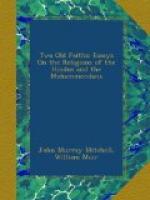[Sidenote: Salvation. Sanctification.] Salvation, in the Christian system, denotes deliverance, not only from the punishment of sin, but from its power, implying a renovation of the moral nature. The entire man is to be rectified in heart, speech, and behavior. The perfection of the individual, and, through that, the perfection of society, are the objects aimed at; and the consummation desired is the doing of the will of God on earth as it is done in heaven. Now, of all this, surely a magnificent ideal, we find in Hinduism no trace whatever.
[Sidenote: Views of life. The great tenet of Hinduism.] Christianity is emphatically a religion of hope; Hinduism may be designated a religion of despair. The trials of life are many and great. Christianity bids us regard them as discipline from a Father’s hand, and tells us that affliction rightly borne yields “the peaceable fruits of righteousness.” To death the Christian looks forward without fear; to him it is a quiet sleep, and the resurrection draws nigh. Then comes the beatific vision of God. Glorified in soul and body, the companion of angels and saints, strong in immortal youth, he will serve without let or hinderance the God and Saviour whom he loves. To the Hindu the trials of life are penal, not remedial. At death his soul passes into another body. Rightly, every human soul animates in succession eighty-four lacs (8,400,000) of bodies—the body of a human being, or a beast, or a bird, or a fish, or a plant, or a stone, according to desert. This weary, all but endless, round of births fills the mind of a Hindu with the greatest horror. At last the soul is lost in God as a drop mingles with the ocean. Individual existence and consciousness then cease. The thought is profoundly sorrowful that this is the cheerless faith of countless multitudes. No wonder, though, the great tenet of Hinduism is this—Existence is misery.
[Sidenote: The future of the race. The struggle between good and evil.] So much for the future of the individual. Regarding the future of the race Hinduism speaks in equally cheerless terms. Its golden age lies in the immeasurably distant past; and the further we recede from it the deeper must we plunge into sin and wretchedness. True, ages and ages hence the “age of truth” returns, but it returns only to pass away again and torment us with the memory of lost purity and joy. The experience of the universe is thus an eternal renovation of hope and disappointment. In the struggle between good and evil there is no final triumph for the good. We tread a fated, eternal round from which there is no escape; and alike the hero fights and the martyr dies in vain.
It is remarkable that acute intellectual men, as many of the Hindu poets were, should never have grappled with the problem of the divine government of the world.




